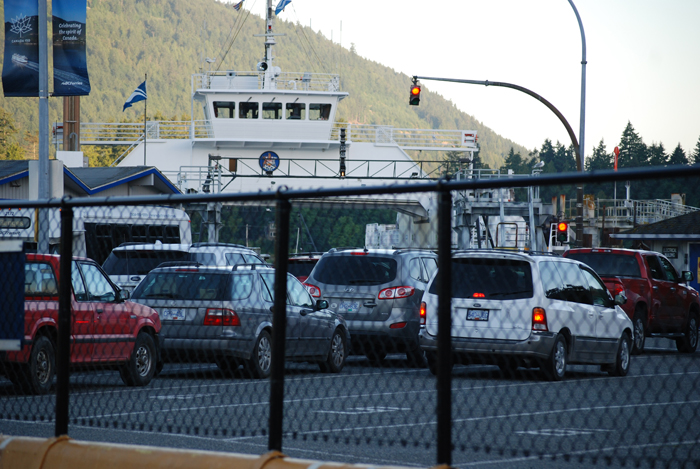Angela Mallard did not board a ferry looking to start a petition. Instead, her focus was driving her friend Kelda Logan to a radiation appointment.
Yet after their experience pleading with ferry workers to get put in the middle lane on the delayed ferry from Salt Spring to Vancouver Island, Mallard decided she needed to act to lessen the stress of islanders travelling for medical reasons. She started a change.org petition calling on BC Ferries to create a priority boarding system for islanders travelling on the Travel Assistance Program (TAP), which as of Tuesday had 4,212 signatures.
“Getting a cancer diagnosis, it absolutely rocks your world in a horrible way,” Logan explained. “It’s so stressful in every area of your life: your family, your relationships, your work, your finances, everything is hard . . . So having additional challenges with your day-to-day making of appointments is not helpful.”
The experience of waiting in ferry line-ups with physical symptoms is another factor. Logan said she experiences persistent fatigue and a burning sensation — “sort of like having a really bad sunburn that you keep going into the sun with, except it’s just on a specific part of your body.”
The trip with Mallard on the ferry was one of many Logan has made, first for multiple surgeries and chemotherapy, then a month of daily weekday radiation appointments.
Hearing the stories of islanders who’ve signed her petition has been overwhelming, Mallard said, especially those from families with children undergoing cancer treatment who have waited for hours in ferry line-ups.
Galiano resident Jeannine Georgeson recounted having to leave the island for a surgery shortly after the 2020 July long weekend. With her trachea between 75 to 80 per cent closed as a result of idiopathic subglottic stenosis, Georgeson tried in vain to make a reservation for the Galiano to Vancouver sailing. It was only thanks to contacts working at the terminal that she was able to make it on.
“It was awful,” she recalled. “I don’t like to cry, but my level of frustration and fear about missing the surgery and the opportunity to breathe again, it was quite overwhelming. And stress never helps any medical situations.”
In recent years, Salt Spring resident Diana Hayes has helped drive people off-island for cancer treatment and surgeries. Before getting on a ferry, many are dealing with pre-operative preparations at home the night before, getting up several hours before departure and being unable to eat or drink. Then, “sitting around in ferry line-ups, traffic and missed ferries [is] very difficult for people that are mobility challenged and not feeling well.” Lack of washroom access is a particular challenge, Hayes added.
And while booking a hotel is a possibility for some, Hayes noted it is not within the means of many islanders and especially seniors.
Mallard and Logan agree that they are not looking to blame BC Ferries or anyone working for the ferry corporation. Their focus, Logan said, is on making the system a more compassionate one.
The exact solution would be determined by the ferry corporation, whose personnel have the expertise, Mallard said. Her proposal is a priority boarding lane, where anyone travelling on TAP can park and be boarded first and be able to drive off the ferry first. This would look different depending on the terminal.
“At many of our terminals, we don’t have sufficient space to dedicate a lane,” executive director of public affairs with BC Ferries Deborah Marshall stated. “We ask customers to let our staff know about your situation and show your practitioner’s letter and they will do their most to help you out.”
Acknowledging that “health concerns are stressful enough without having to worry about travelling to and from important appointments,” Marshall mentioned the existing Medical Assured Loading (MAL) program.
Implemented in July 2020, people travelling for medical specialist services on TAP can ask their doctor for a letter and receive assured loading. To qualify, their doctor needs to determine that “an extended wait at a ferry terminal for a ferry sailing could cause risk to their health.”
Mallard and Logan have several issues with the MAL program: it is not well known, not easy to qualify for and is up to interpretation by doctors as to what “risk to their health” means. It also adds more paperwork and visits to family doctors, who are overburdened and whose time is in short supply.


I’m reluctant to sign the petition simply because I really want BC Ferries to make big leaps in efficiency and customer service, rather than just taking baby steps. For example, why not allow people to book all ferry routes online and then just show up with a QR code on your phone that gets scanned by a machine? The online app would show the percentage of space remaining and travelers wouldn’t have to waste hours of their lives arriving super early and then waiting for important appointments. Cancellations would be easy and only cost a small fee if done within an hour of scheduled departure. This stuff isn’t rocket science. The reason why innovative solutions like these won’t happen is because senior management has no incentive to find optimal solutions and it would also mean a bunch of customer support people wouldn’t be needed.